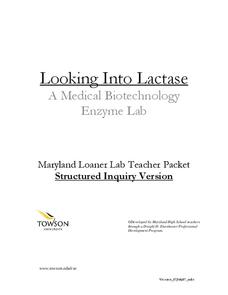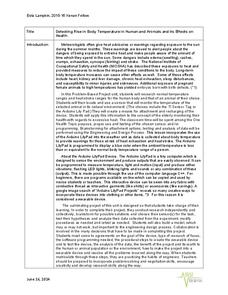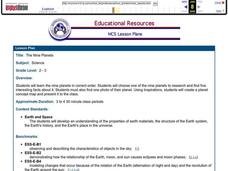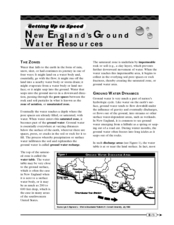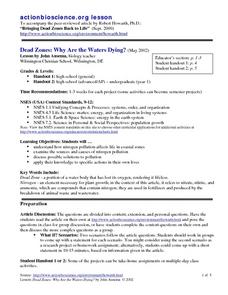Maryland Department of Education
The Concept of Diversity in World Literature Lesson 13: Unit Culmination - Symposium
To conclude a unit on the concept of diversity in world literature, class members conduct a symposium on "African Literature in Global Perspectives." In order to earn a spot on the panel, individuals craft an original thesis that...
Civil War Trust
Transcribing Civil War History
Primary sources are valuable for understanding the context of historical events, but the diction and dialect in these documents can be difficult to understand. Middle and high schoolers participation in a transcription process in which...
School Improvement in Maryland
Immigration Legislation
What is the purpose of immigration legislation? How has this legislation evolved over the years? What are the factors that caused these changes? Class members research immigration legislation to determine whose rights the laws are...
Energy for Keeps
The Energy Times
Extra! Extra! Read all about past and present energy use in a classroom-made historical newspaper. Useful as a cross-curricular assignment between science, history, and language arts, the project is sure to get young journalists...
Intel
Pedal Power
Show your classes the importance of mathematics in something as simple as bicycle design. The final lesson in the six-part STEM series has each group research a different aspect of the bicycle. Learners use mathematical formulas, linear...
Teach Engineering
Rock Candy Your Body
Candy rocks! A sweet lesson offers a different take on the rock candy experiment. Groups use a supersaturated sugar solution to create rock candy. Pupils then add other ingredients to the solution to test their effect on the...
NOAA
Wet Maps
How do oceanographers make maps under water? Junior explorers discover the technologies and processes involved in creating bathymetric maps in part three of a five-part series designed for fifth- and sixth-grade pupils. The lesson plan...
Towson University
Looking Into Lactase: Structured Inquiry
Why is lactase important? Biology scholars explore enzyme function in a structured inquiry lab. The activity tasks lab groups with observing how temperature and pH affect enzyme activity, as well as determining which milk products...
Kenan Fellows
Detecting Rise in Body Temperature in Human and Animals and its Effects on Health
Beat the heat using sensors. Scholars research normal body temperatures for humans and a specific animal. In groups, they create sensors that monitor body temperature, as well as the weather. The goal is to reduce the occurrence of heat...
Annenberg Foundation
America's History in the Making: Classroom Applications Four
The final installment of a 22-part American history series examines the many faces that make up the country's story. From Henry Ford to Tulio Serrano, scholars use biographical evidence and Internet research to uncover the people behind...
State Bar of Texas
Schenck v. US
Freedom of speech is absolute—or is it? The Supreme Court case Schenck v. United States has learners research what free speech really looks like. A short video along with paired work creates open discussion and thought on what speech is...
Cold Spring Harbor Laboratory
The RNA Message Is Sometimes Edited
In 1993, Phillip Sharp and Richard Roberts won the Nobel Prize for their discovery of split gene theory. Learn about the breakthrough with the help of an online interactive. Hear both scientists explain it in their own words, watch an...
Teaching Tolerance
Journalism for Justice
Roll the presses! Or at least have your class members participate in the time-honored tradition of the student press by creating their own newspapers or journalist pieces on a social problem. After conducting research and collaborating...
Curated OER
Life in the Crystal Palace
Marine biologists research sea ice communities. Assign some groups to construct paper models of sea ice communities in winter, and some to construct models of them in summer. The lesson is simplistic, but the Internet resources provided...
Curated OER
The Nine Planets
A solid lesson on teaching the nine planets in our solar system is here for you. In it, young scientists learn the correct order of the planets, and they choose one of the planets to do a research report on. They must come up with five...
Curated OER
Christmas Candy
Here is a tasty topic for a lesson: Christmas candy! Third and fourth graders research classic Christmas candies, then create their very own! They write a descriptive paragraph about their candy, then use KidPix to create an illustration...
Curated OER
INVITING CANDIDATES TO CLASS
Students explore the election process by researching politcal platforms, inviting candidates to speak, surveying registered voters, and running a mock election.
Curated OER
Outreach and Distribution Lesson Plan
Young scholars study the process for outreach and distribution of films. They design outreach and distribution plans for films which they create.
Environmental Protection Agency (EPA)
New England's Ground Water Resources
Learn all about where ground water is stored, how it moves, and how it is accessed in a detailed and thorough 10-page reading. Whether supplementing reading for an existing environmental or earth science course or providing background...
Curated OER
Dead Zones: Why Are the Waters Dying?
Young scholars investigate the effects of pollution on marine ecosystems. They read and discuss an article, identify the effects of pollution on marine life, conduct research on local nutrient pollution, and conduct local water quality...
Curated OER
After the American Revolution: Free African Americans in the North
Students investigate the life of African Americans in the North during the American Revolution. They analyze how authors use various techniques to write biographies, read about Sojourner Truth, conduct research, and write an excerpt...
Curated OER
Citizen Advocacy
Students examine how citizens can influence legislation. They watch a video, develop a list of how citizens can influence legislation, answer video discussion questions, conduct Internet research, and write a recommendation for change to...
NOAA
It's a Roughy Life
Scientists recently discovered several previously unknown species at the Bear Seamount off the coast of New England. Scholars research these new species — benthopelagic, benthic, and seamount fish — and find out what makes them unique....
PBS
Writing a Historical Poem
Students conduct field research of a historical site in order to discover a more complete understanding of a time period. They choose one particular historical figure and write a short poem about the site from the historical person's...
Other popular searches
- Research Process Checklist
- Writing and Research Process
- Writing Research Process
- The Research Process
- Mla Research Process
- Marketing Research Process
- Research Process i.i.m.
- Research Process Films
- Mal Research Process
- Research Process and Skills
- Research Process Iim
- The Research Writing Process









